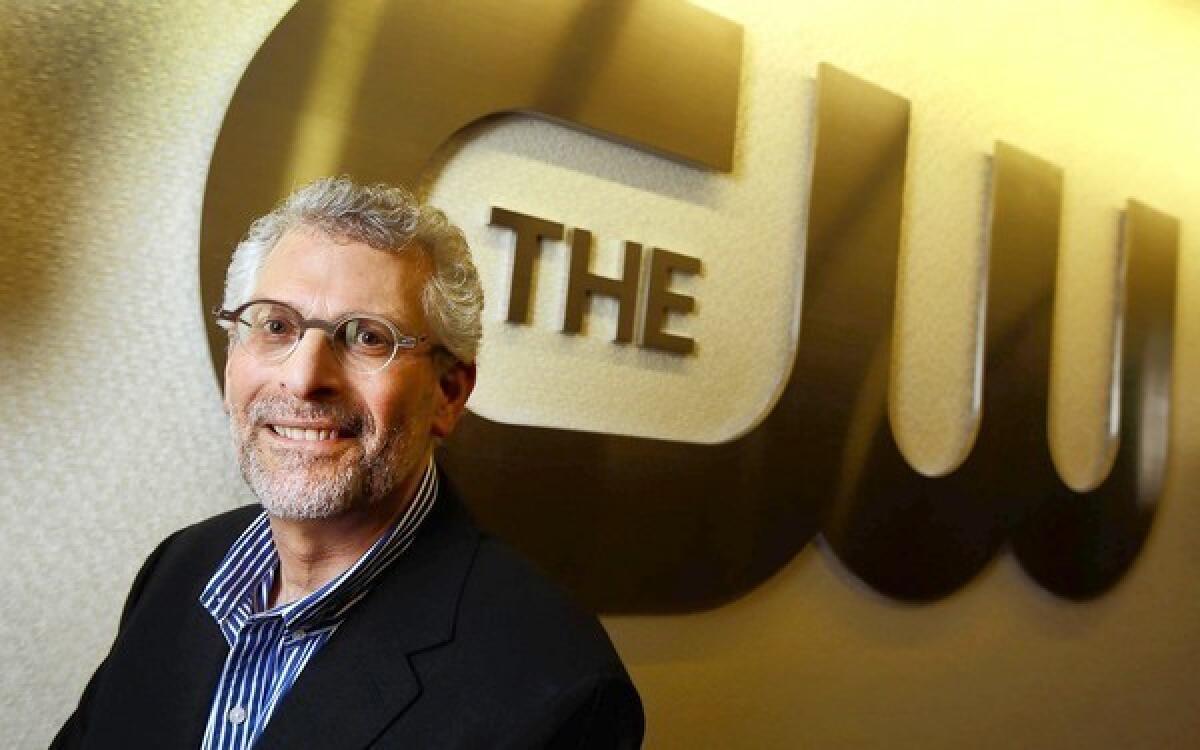CW network revamp aims to draw wider audience

Is the audience for the CW, a network known for shows about teenage vampires and trendy high school students, getting a little long in the tooth?
This season, the median age of its audience is nearly 42.
That looks like trouble. The female-friendly, 7-year-old network targets the 18- to 34-year-old demographic. But CW’s executives aren’t running away from middle age. They are trying to attract a more diverse audience.
PHOTOS: Celebrity portraits by The Times
“I thought we had become too niche,” said CW President Mark Pedowitz, who took the reins at the network in 2011. “And, the thing is, you want everyone to participate.”
The network, a joint venture between CBS Corp. and Warner Bros., underwent a series of changes this season — including a massively overhauled schedule and a delayed season start — in a bid to turn around last season’s disappointing ratings, which saw a 15% slide in total viewership and an 18% drop in the young adult demographic, according to Nielsen.
Its programming slate, in turn, ventured outside the juniors department. Executives beefed up on darker fare — with the superhero drama “Arrow,” the procedural show “Beauty and the Beast” and the recent launch “Cult” — partly as an attempt to lure male audiences. They also rejiggered the channel’s signature female-saccharine formula with the additions of “Emily Owens, M.D.” and the “Sex and the City” prequel “The Carrie Diaries.”
The 2013-14 slate is shaping up to be equally brand-expanding. The network has eight pilots in development, some in line with its traditional personality, such as “The Vampire Diaries” spin-off “The Originals.”
Others are venturing a bit outside the brand lines. The network has a number of science fiction projects in the works, one about a romance between a human girl and an alien boy, and another set 97 years after a nuclear war, about human survivors on a spaceship traveling back to Earth to recolonize the planet.
More than just a strategy to attract new viewers, the content-stretching demonstrates a network evolving with its core audience, said Neil Howe, an authority on generations and president of the consulting firm LifeCourse Associates.
PHOTOS: Hollywood back lot moments
“What’s happening now is that they’re moving away from an exclusive focus on teens and … slowly moving into a more twentysomething focus/supernatural market,” Howe said. “Rather than always going to the trouble of capturing a new set of viewers every year, why not just age with the same people?”
The network was born of the former fledgling networks WB and UPN. (Tribune, which owns the Los Angeles Times, is the network’s biggest affiliate, with 13 television stations that run CW programming, including KTLA-TV Channel 5 in Los Angeles.) It launched in fall 2006 with an identity crisis: an amalgamation of different audiences and different show types forced together. The venture came at an especially interesting time, as new technology was beginning to present new ways of watching TV.
“Everything was in flux,” said Rick Haskins, who heads marketing for the CW. “Networks were trying to figure out why the ratings were not as big as they used to be. We knew we needed to be where our audience was, whenever they were there, to try to get them a message that is relevant for them to watch a show. I think we’ve been very nimble in allowing the viewer to watch the series where they want to watch.”
Since its launch, the CW’s ratings — like the networks from which it was born — have perpetually trailed behind Fox, CBS, ABC and NBC. But the network’s executives have long said those numbers are not representative of their actual audience, one habituated to untraditional viewing habits such as watching their shows on laptops or tablets, or using a DVR to watch CW shows a day or two after their initial broadcast.
Digital platforms now account for 20% of the CW’s in-season viewership, according to the network. Becoming stronger in that area is a big priority. It strengthened its website, and last year switched to next-day streaming for episodes of its prime-time series. The network also entered into two major online distribution deals with Netflix Inc. and Hulu, the former estimated to be worth $1 billion.
The deals helped the network become profitable for the first time last year with about $39 million in cash flow and net revenue of $621 million, up from $528 million in 2009, industry consulting firm SNL Kagan said.
Pedowitz may find support among advertisers who might traditionally have been interested in the Nielsen numbers for only 18- to 34-year-old viewers.
PHOTOS: Celebrity portraits by The Times
“They were really the first network in the marketplace to see that there is value in audiences who watch their programs on both the linear television as well as online, or on a tablet, or on a mobile phone,” said Darcy Bowe, an investment director at ad buying company Starcom. “We look at this model as what we’re trying to do. We want our advertisers to be in front of consumers — it doesn’t matter if it’s on the television or elsewhere.”
Of its five new series this season, “Arrow” is the network’s most-watched show, and the only one generating a real pulse in the traditional Nielsen sense.
But its ratings would be higher, Pedowitz suggests, if viewership measurement were more comprehensive.
The CW’s series see a significant boost from DVR playback. “Arrow” has averaged about 3.4 million viewers per episode this season, but when DVR numbers are factored in, the average viewership rises to 4.5 million. “The Vampire Diaries” averages about 2.8 million viewers, and sees a rise to 4 million when DVR views are included.
Pedowitz, a former president of ABC Studios, admits the new dynamic took some getting used to on his part.
“It’s the way we have to start looking at things,” he said. “The 18-34 demographic aren’t the only ones watching differently. As Dorothy says to Toto, this doesn’t feel like Kansas anymore. It’s a different world.”
PHOTOS, VIDEOS & MORE:
PHOTOS: Behind the scenes of ‘Downton Abbey’
VIDEO: Winter TV preview
PHOTOS: Violence in TV shows
More to Read
From the Oscars to the Emmys.
Get the Envelope newsletter for exclusive awards season coverage, behind-the-scenes stories from the Envelope podcast and columnist Glenn Whipp’s must-read analysis.
You may occasionally receive promotional content from the Los Angeles Times.











